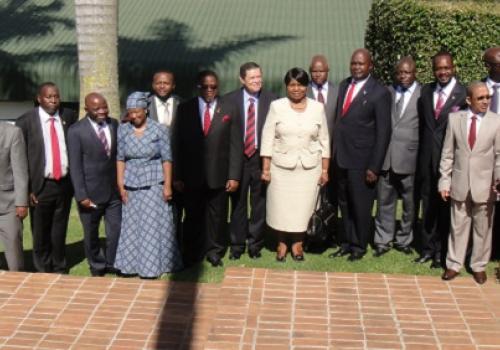Ezulwini, Kingdom of Swaziland: The Joint Extra Ordinary Meeting of the Ministers of Environment and Natural Resources and of the Organ on Defence, Peace and Security Cooperation of the Southern African Development Community (SADC) met on 3 February 2017, in Ezulwini, the Kingdom of Swaziland and adopted the SADC Law Enforcement and Anti-poaching Strategy (LEAP).
The SADC LEAP Strategy aims at reducing the level of poaching and illegal trade in wildlife fauna and flora and enhance law enforcement capacity in the SADC Region by 2021 focusing on: enhancement of legislation and judicial processes; minimization of wildlife crime and illegal trade; improvement and strengthening of field protection; integration of people and nature in natural resources management; and ensuring sustainable trade and use of natural resources.
In his remarks, Dr. Thembinkosi Mhlongo, the SADC Deputy Executive Secretary responsible for Regional Integration, emphasized that the Illegal harvesting and wildlife trafficking is a serious challenge to the region as it erodes biodiversity, threatens the survival of targeted species, and undermines the wealth of nations while generating monetary gain for organised crime. Given the transnational nature of this challenge, it needs to be addressed in a collaborative manner at regional level.
In his opening speech, Honourable Christopher Gamedze, Chairperson of the Joint Ministerial meeting and Minister of Tourism and Environmental Affairs of the Kingdom of Swaziland stressed that wildlife in SADC region is a major draw card for adventure tourism which is one of the major foreign exchange earner and job creation for both skilled and semi-skilled members of our societies, thus contributing to the growth of our economies. He further indicated that research has shown that a majority of our visitors from abroad choose their holidays based on safari tours and other wildlife adventures, thus Southern Africa wildlife adventure destination is a mainstay of our tourism. If we do not save our already threatened wildlife species, we are likely to witness highly reduced tourism traffic volumes to Southern Africa in a near future thus placing our ecotourism industry in jeopardy.
In order effectively implement the LEAP strategy, the Ministers approved the establishment of the Regional Wildlife Crime Prevention and Coordination Unit (WCPCU), that will be supported by the National Wildlife Crime Prevention Task forces comprising of Police, Wildlife, Customs, Defence, Immigration, Intelligence and Judiciary officials in each Member State.
The meeting was attended by Angola, Botswana, Democratic Republic of Congo Lesotho, Malawi, Mozambique, Namibia, South Africa, Swaziland, Tanzania, Zambia and Zimbabwe.

